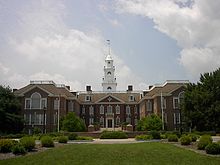Delaware General Assembly
Delaware General Assembly | |
|---|---|
 | |
| Type | |
| Type | |
| Houses | Senate House of Representatives |
| Leadership | |
| Structure | |
| Seats | 62 |
 | |
Senate political groups |
|
 | |
House of Representatives political groups |
|
| Elections | |
Last Senate election | November 8, 2022 |
Last House of Representatives election | November 8, 2022 |
Next Senate election | November 5, 2024 |
Next House of Representatives election | November 5, 2024 |
| Meeting place | |
 | |
| Legislative Hall Dover | |
| Website | |
| legis.delaware.gov | |
The Delaware General Assembly is the
Governor can call a special session
of the legislature at any time.
Members are elected from
term limits
for either chamber.
With 62 seats, the Delaware General Assembly is the second-smallest bicameral
Nevada
(63).
History
The Delaware General Assembly was one of the thirteen legislatures that participated in the
Delaware Constitution of 1897, and Supreme Court of the United States decision in Reynolds v. Sims
in 1965.
Significant actions of the General Assembly include the calling of the
slave state
. Also significant was its repeated refusal to legislate the end of slavery or voting rights for women, requiring federal law to enforce those changes.
Until 1898 the General Assembly was apportioned by county, with a total of 30 members elected county-wide "
hundreds within the counties. However, there was little recognition of disparities in population, except for the addition of two extra senators and five extra representatives elected from much more populous New Castle County
. After the Supreme Court decision in Reynolds v. Sims in 1965, the General Assembly was forced to redistrict so that all members of both houses were elected from districts of equal population. By 1972, the total membership had increased to its present 62.
In 1924, Florence Wood Hanby became the first woman elected to the Delaware General Assembly, winning a seat in the Delaware House of Representatives.[1][2]
It is the only legislature with the power to unilaterally amend
its constitution without requiring a referendum or any other approval.[3]
See also
References
- ^ "Woman Wielding Power: Pioneer Female State Legislators". National Women's History Museum. Archived from the original on September 6, 2015. Retrieved December 22, 2015.
- ISBN 9781608710072.
- ^ "ARTICLE. XVI AMENDMENTS AND CONVENTIONS". delcode.delaware.gov. Retrieved April 6, 2018.
